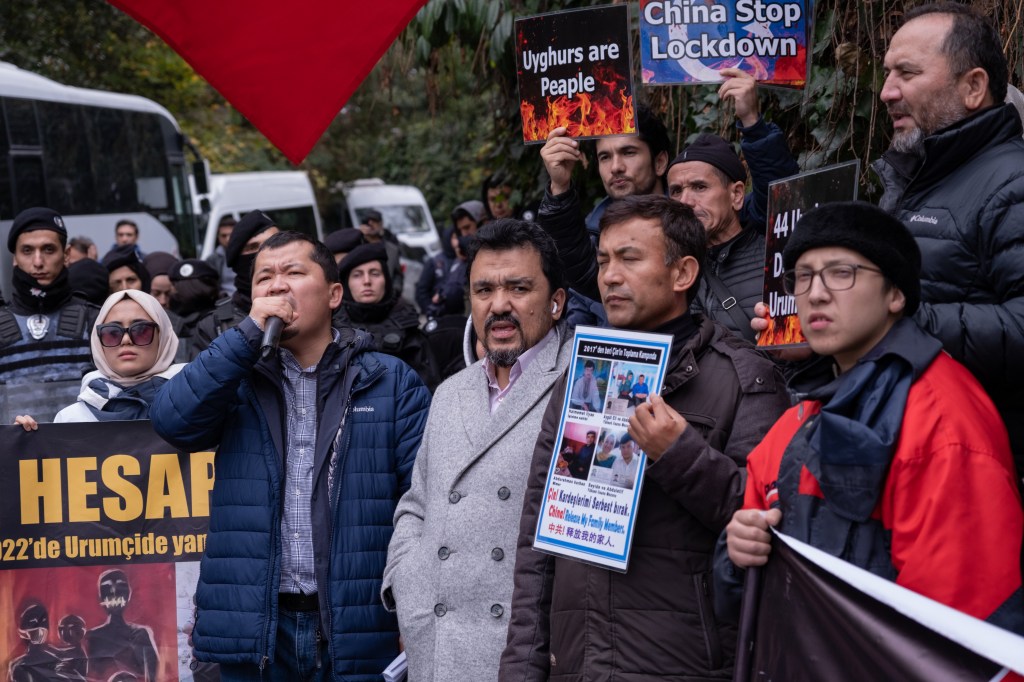ISTANBUL—Uyghur exiles have hoped for solidarity from their Muslim brothers and sisters as they’ve protested persecution by the Chinese government. In Istanbul last week, they instead faced police decked out in riot gear and threats of deportation.
The clash epitomized the growing sense of abandonment Uyghurs feel from Muslim-led countries. For years their pleas for help from the Islamic world in the face of China’s long oppression and recent genocide in Xinjiang have largely gone unanswered. Turkey, which hosts one of the largest Uyghur populations outside of China—many of them refugees—has historically been one of the diaspora’s most steady allies. But its friendship has been inconsistent.
Protesters arrived outside the Chinese consulate in Istanbul at 5 a.m. last Wednesday, braving the winter chill to draw attention to an ongoing genocide in Xinjiang (also known as East Turkestan to Uyghurs) and the recent deadly fire in its provincial capital of Urumqi. Police soon worked to clear demonstrators from the area, threatening those who refused to comply with deportation—particularly dangerous for refugees fleeing genocide—and escorting stragglers away from the consulate one-by-one. Still, some protesters, including one woman who said she hasn’t heard from her three children in Xinjiang for more than six years, sought to break through the police barricades.
“Terrorist China!” the group chanted. “Fascist China! Stop Uyghur genocide!”
Attendees made the case for unity, waving the Turkish flag alongside the light blue Uyghur flag, both emblazoned with the star and crescent moon of Islam. Shouts of “Muslim don’t sleep, take care of your brother” erupted from the crowd.
Turkish Interior Minister Suleyman Soylu later apologized for the threats by law enforcement and promised to launch an investigation. But authorities continued to push back on demonstrations, blocking off the street leading to the Chinese embassy. Undeterred, the Uyghurs regrouped near the seaside for several days of protests.
“Look at my mom and youngest sibling. Look at their dead bodies,” a young man named Mohammad Mehmet Ali said, voice shaking. “We can’t even make her funeral.”
Ali lost five family members in the Urumqi fire. Chinese media reported that 10 people died in the blaze—though protesters with contacts in the city said the actual number is likely closer to 40—as COVID-19 lockdown measures hindered escape and rescue efforts. Some demonstrators in Istanbul burned images of their loved ones.
Traveling back to Xinjiang to attend his family’s funeral services would almost certainly mean arrest for Ali, as it would for other Uyghurs: They and other Muslim minorities are under constant threat of arbitrary detention by Chinese authorities. Police in Xinjiang particularly target those who have spent time abroad. So they watch their loved ones’ plight from afar and petition governments, including the Islamic world, for help.
Since 2017, China is estimated to have detained as many as 1.8 million people in Xinjiang internment camps, where inmates face forced labor, sterilization, and torture. Throughout the broader region, police have slashed birth rates by forcing abortions, sterilization, and birth control on ethnic minorities. Chinese officials, claiming the repressive measures are to stamp out extremism, have destroyed mosques and holy sites, banned Islamic teachings, and targeted Muslim scholars and political leaders for detention, some of whom have reportedly died while incarcerated. Simple acts like praying and owning a Quran can land Uyghurs extremism charges and indefinite stays in concentration camps.
Turkey hasn’t always been reluctant to call out China’s actions. Turkish President Recep Tayyip Erdogan was one of the first world leaders to call the persecution of Uyghurs a “genocide” in 2009, and, three years later, became the first Turkish leader to tour Xinjiang in nearly three decades.
But as the Chinese government intensified its repression of Uyghurs over the last decade, Erdogan’s government backed off.
Chinese media quoted Erdogan as saying that ethnic minorities “live happily” in Xinjiang in 2019—the same year he declared that Islamophobia was “taking over Western communities like cancer.” His Justice and Development Party (AKP) party has voiced its support for “China’s right to fight terrorism” and struck down opposition-sponsored motions in parliament to investigate China’s treatment of the Uyghurs, all the while presenting itself to voters as the champion of Islam.
In 2019 Erdogan submitted to parliament an extradition deal that would expedite deportations of Uyghurs to China. The Turkish side has yet to ratify the agreement amid resistance from opposition lawmakers, but that hasn’t stopped the government from carrying out forced repatriations at China’s request: Reports of Uyghur dissidents being deported to China via third countries in exchange for COVID-19 vaccinations emerged in 2021.
Turkey isn’t alone—hundreds of forced deportations of Uyghurs have taken place across the Muslim world. According to a database by the DC-based Oxus Society for Central Asia Affairs, at least 292 Uyghurs have been deported from the Arab countries of Morocco, Egypt, Saudi Arabia, Syria, and the UAE at China’s request since 2002. During a meeting with Chinese President Xi Jinping in 2019, Saudi Arabian Crown Prince Mohammed bin Salman reportedly backed China’s right to conduct “de-extremism” and “anti-terrorism” measures.
A cruel fate awaits Uyghurs who return to Xinjiang, voluntarily or otherwise. “If I go back to [my] home, they will put me in jail,” said Iparhan Uygur, a young Uyghur woman now living in Istanbul. “We know this. We saw many examples of this. People went back to East Turkestan and disappeared immediately.”
Other activists say Chinese officials have threatened them on Turkish soil for openly supporting the Uyghur cause. There have even been reports of disappearances off the streets of Istanbul.
The Islamic world’s complicity in Xi’s transnational targeting of Uyghurs indicates that Beijing’s global investments are paying political dividends. China has put massive sums of money into funding military projects, purchasing raw material and energy, and supporting manufacturing projects across Asia, Africa, and the Middle East.
Some leaders have been brazenly transparent about the dynamic: When pressed on the genocide in a 2021 interview, then-Pakistani prime minister Imran Khan was silent about the plight of the Uyghurs. He told Axios that “China has been one of the greatest friends to us in our most difficult times. When we were really struggling, our economy was struggling, China came to our rescue. So we respect the way they are.”
Many of the top recipients of the Belt and Road Initiative (BRI), a multi-billion dollar Chinese infrastructure scheme spanning several continents, are Muslim-majority countries. Speaking from Islamabad, Pakistan, earlier this year, Chinese Foreign Minister Wang Yi said Beijing is investing more than $400 billion in 54 Muslim countries. Last month Pakistani Prime Minister Shehbaz Sharif invited Erdogan to join China-Pakistan Economic Corridor (CPEC), a $60 billion BRI project.
Turkey’s financial crisis makes it unlikely to snub its economic partner in Beijing, even faced with overwhelming evidence of religiously motivated human rights violations.
“Trade between China and Turkey. This is the most important reason for the continuing silence,” said Dolkun Isa, president of the World Uyghur Congress.
The Chinese government has also launched successful propaganda campaigns to sway people inside Muslim countries from supporting the Uyghur cause. Memet Tohti Atawulla, senior program officer at the D.C.-based Center for Uyghur Studies, said Chinese misinformation about Uyghurs center on two claims that resonate with Muslim communities: that the Uyghurs constitute a terrorist organization and are pawns of the West.
“China is trying to make Muslim communities believe that Western countries, especially the USA, are using Uyghurs as a tool to intervene in China’s internal affairs,” Atawulla said.
The fact that much of the Islamic world is dominated by unelected leaders and aspiring autocrats means turning the spotlight on China risks bringing attention to their own abuses at home. But recent protests among those who stand to lose the most by standing up to the Chinese government—the Chinese people—have inspired some optimism among the Uyghur diaspora. Xi’s draconian COVID-19 measures may have given China’s Han majority a small taste of what their people have endured for decades, activists say.
“The CCP is masterful at brainwashing. This is the reason most Chinese people, civilians, really don’t understand what’s going on for the Uyghurs,” said Isa, pointing to opposition to Beijing’s “zero-COVID” policy as a common goal of China’s different ethnic groups. “If today there’s continued silence from Chinese people, tomorrow the same thing will be happening with the Chinese people, civilians.”







Please note that we at The Dispatch hold ourselves, our work, and our commenters to a higher standard than other places on the internet. We welcome comments that foster genuine debate or discussion—including comments critical of us or our work—but responses that include ad hominem attacks on fellow Dispatch members or are intended to stoke fear and anger may be moderated.
With your membership, you only have the ability to comment on The Morning Dispatch articles. Consider upgrading to join the conversation everywhere.